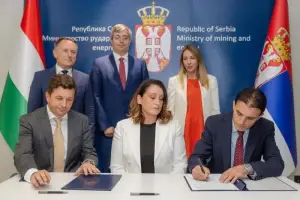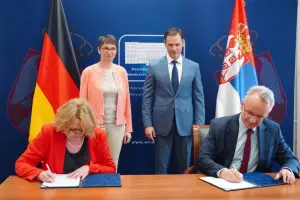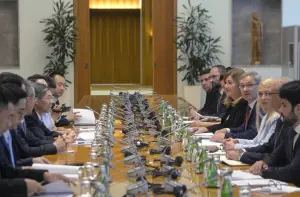- Serbia
Get to know Serbia
- Citizens
Culture and science
Health services
Pension and disability insurance
- Business
Employment
Economy
- Media
- Government
- Contact
Keep in touch
Contact form
Back
Keepin touch
Whether you have a question, comment, suggestion or any problem in the purview of the government, send us your message and we will try to respond as soon as possible. If your problem is not in our purview, we will forward your message to the relevant institution.
Q:
A:
Free trade agreement with EFTA countries effective as of today
Belgrade,
1 October 2010
The Ministry of Economy and Regional Development announced that a free trade agreement between Serbia and EFTA countries will be effective as of today.
This will provide Serbian businessmen with free access to the markets of more than 800 million people, including a free trade agreement with the EU (Interim Agreement), CEFTA countries, the Russian Federation, Belarus and Turkey.
The European Free Trade Association (EFTA), which consists of Iceland, Liechtenstein, Norway and Switzerland, is a market of 13 million potential consumers. This agreement creates additional possibilities for new investment from these countries in the Serbian economy and the possibility of mutual cooperation for joint action in third markets.
Swiss and Norwegian investors have been on the list of the biggest investors in Serbia since 2001. This agreement will enable a substantial increase in the volume of Serbian exports and overall trade, which in the previous period with EFTA countries amounted to more than €250 million a year.
The agreement will ensure a sort of asymmetrical trade liberalisation in Serbia’s favour, with the possibility of applying cumulative rules of origin, which will help Serbian exporters to become more competitive in EFTA markets.
On the day the EFTA agreement is enforced, all customs tax for industrial products will be abolished, and as for agricultural products, Serbia will be treated in much the same way as EU countries.
Seven out of ten of Serbia’s most important export products to EFTA countries are included in the list of 20 products which EFTA members import the most. Serbia’s chief export products are aluminium, fruit, car parts, copper, panels, sheet metal and parts for wood furniture.
Due to a specific ratification procedure, the agreement will be enforced today between Serbia on the one hand and Switzerland and Lichtenstein on the other, while the ratification in the Norwegian and Icelandic parliaments will take place early in 2011.
The agreement was signed on 17 December 2009 in Geneva and ratified by the Serbian Parliament on 26 May 2010, reads the statement and recalls that EFTA was founded in 1960.
The European Free Trade Association (EFTA), which consists of Iceland, Liechtenstein, Norway and Switzerland, is a market of 13 million potential consumers. This agreement creates additional possibilities for new investment from these countries in the Serbian economy and the possibility of mutual cooperation for joint action in third markets.
Swiss and Norwegian investors have been on the list of the biggest investors in Serbia since 2001. This agreement will enable a substantial increase in the volume of Serbian exports and overall trade, which in the previous period with EFTA countries amounted to more than €250 million a year.
The agreement will ensure a sort of asymmetrical trade liberalisation in Serbia’s favour, with the possibility of applying cumulative rules of origin, which will help Serbian exporters to become more competitive in EFTA markets.
On the day the EFTA agreement is enforced, all customs tax for industrial products will be abolished, and as for agricultural products, Serbia will be treated in much the same way as EU countries.
Seven out of ten of Serbia’s most important export products to EFTA countries are included in the list of 20 products which EFTA members import the most. Serbia’s chief export products are aluminium, fruit, car parts, copper, panels, sheet metal and parts for wood furniture.
Due to a specific ratification procedure, the agreement will be enforced today between Serbia on the one hand and Switzerland and Lichtenstein on the other, while the ratification in the Norwegian and Icelandic parliaments will take place early in 2011.
The agreement was signed on 17 December 2009 in Geneva and ratified by the Serbian Parliament on 26 May 2010, reads the statement and recalls that EFTA was founded in 1960.
-
 Požega, 5 July 2025
Požega, 5 July 2025Section of Pakovraće - Požega highway officially opened
-
 Belgrade, 2 July 2025
Belgrade, 2 July 2025Technical specifications defined for Serbia-Hungary oil pipeline
-
 Belgrade, 30 June 2025
Belgrade, 30 June 2025IMF confirms Serbia successfully implementing all agreed reforms
-
 Belgrade, 27 June 2025
Belgrade, 27 June 2025Double Taxation Avoidance Agreement with Germany signed
-
 Kostolac, 25 June 2025
Kostolac, 25 June 2025Construction of Kostolac wind farm nearing completion
-
 Belgrade, 24 June 2025
Belgrade, 24 June 2025Government supports request for new postponement of sanctions against NIS
-
 Belgrade, 23 June 2025
Belgrade, 23 June 2025Procedures to facilitate sale of Serbian products to China to be accelerated
-
 Belgrade, 21 June 2025
Belgrade, 21 June 2025Serbia receives first funds under Growth Plan for the Western Balkans
-
 Belgrade/Cairo, 20 June 2025
Belgrade/Cairo, 20 June 2025New phase in relations with Egypt in field of agriculture
-
 Belgrade/Athens, 18 June 2025
Belgrade/Athens, 18 June 2025Serbia’s leadership position in power sector
